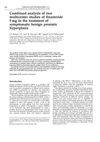 March 2024 in “Dermatology and therapy (Internet)”
March 2024 in “Dermatology and therapy (Internet)” Genetic factors could lead to personalized treatments for hair loss.
 2 citations,
August 2020 in “Cosmetics”
2 citations,
August 2020 in “Cosmetics” Herbal formula shows promise for hair loss treatment.
2 citations,
December 2013 in “Cancer research” Enobosarm may effectively treat androgen receptor-positive breast cancer with fewer side effects.
 6 citations,
September 1997 in “Prostate Cancer and Prostatic Diseases”
6 citations,
September 1997 in “Prostate Cancer and Prostatic Diseases” Finasteride 5 mg effectively reduces urinary symptoms and PSA levels in men with enlarged prostates, with few sexual side effects.
 18 citations,
January 1998 in “Endocrine”
18 citations,
January 1998 in “Endocrine” RU58841, a nonsteroidal anti-androgen, showed potential as a topical treatment for hair loss, increasing hair density, thickness, and length without systemic side effects in Stumptailed Macaques.
 11 citations,
January 1998 in “Dermatology”
11 citations,
January 1998 in “Dermatology” Spironolactone works well for acne and hirsutism, isotretinoin is very effective for acne and may have antiandrogenic effects, and 5 alpha-reductase inhibitors should be considered antiandrogens.
 28 citations,
January 1991 in “Reproductive Toxicology”
28 citations,
January 1991 in “Reproductive Toxicology” Finasteride temporarily lowers male rat fertility without affecting libido.

Maintaining enough zinc may help prevent and manage hair loss.
 37 citations,
January 1991 in “Reproductive Toxicology”
37 citations,
January 1991 in “Reproductive Toxicology” Finasteride reduces male rat fertility by causing issues with copulatory plug formation.
 21 citations,
April 1998 in “Urology”
21 citations,
April 1998 in “Urology” Finasteride effectively treats BPH and hair loss but may cause sexual side effects.
 8 citations,
March 2020 in “Aesthetic Plastic Surgery”
8 citations,
March 2020 in “Aesthetic Plastic Surgery” Finasteride and minoxidil together safely and effectively increase hair growth and density for androgenetic alopecia.
 8 citations,
October 1998 in “Comparative Biochemistry and Physiology Part C: Pharmacology, Toxicology and Endocrinology”
8 citations,
October 1998 in “Comparative Biochemistry and Physiology Part C: Pharmacology, Toxicology and Endocrinology” Proscar (finasteride) blocks 5α-reductase in sea urchin ovaries and testes, suggesting potential treatment for androgen-related conditions.
 5 citations,
June 2012 in “Journal of Cosmetic and Laser Therapy”
5 citations,
June 2012 in “Journal of Cosmetic and Laser Therapy” Finasteride and intense pulsed light effectively reduce unwanted facial hair in women, but may not be cost-effective.
 108 citations,
September 2002 in “The Journal of clinical investigation/The journal of clinical investigation”
108 citations,
September 2002 in “The Journal of clinical investigation/The journal of clinical investigation” Lowering testosterone speeds up wound healing in male mice.
 52 citations,
June 1999 in “Endocrinology and Metabolism Clinics of North America”
52 citations,
June 1999 in “Endocrinology and Metabolism Clinics of North America” Antiandrogen treatments combined with oral contraceptives can help manage hair growth and hair loss in women with PCOS.
 27 citations,
August 1999 in “Urology”
27 citations,
August 1999 in “Urology” Finasteride improves urinary function in men for 2 years.
July 2005 in “Indian Journal of Dermatology”  48 citations,
January 2017 in “Skin Pharmacology and Physiology”
48 citations,
January 2017 in “Skin Pharmacology and Physiology” Finasteride-loaded nanoparticles may help treat alopecia.
1 citations,
October 2022 in “Iet Nanobiotechnology” The dutasteride nanoemulsion could improve hair loss treatment by enhancing drug penetration and retention in hair follicles.
 127 citations,
June 2006 in “International Journal of Pharmaceutics”
127 citations,
June 2006 in “International Journal of Pharmaceutics” Liposomes and niosomes improve finasteride delivery for hair loss treatment.
February 2024 in “Cosmetics” The conclusion is that new plant-based treatments for hair loss may work by targeting certain enzymes.
 56 citations,
January 2007 in “Pharmaceutical Development and Technology”
56 citations,
January 2007 in “Pharmaceutical Development and Technology” Liposomes improve finasteride delivery for hair loss treatment, making it a promising option for topical use.
 1 citations,
January 2017 in “Asian Journal of Chemistry”
1 citations,
January 2017 in “Asian Journal of Chemistry” New method effectively analyzes finasteride and its stability.
 8 citations,
January 2016 in “Evidence-based Complementary and Alternative Medicine”
8 citations,
January 2016 in “Evidence-based Complementary and Alternative Medicine” Rumex japonicus extract may promote hair growth more effectively than Minoxidil.
89 citations,
August 2013 in “PloS one” Androgen receptors are active in many tissues of both male and female mice, not just reproductive organs.
 1 citations,
September 2021 in “Skin appendage disorders”
1 citations,
September 2021 in “Skin appendage disorders” Botulinum toxin injections can help treat common hair loss in men, but more research is needed to confirm this and understand how it works.

Botulinum toxin injections can reduce hair loss and stimulate new hair growth in some men with male pattern baldness.
 23 citations,
January 2002 in “Journal of Cutaneous Medicine and Surgery”
23 citations,
January 2002 in “Journal of Cutaneous Medicine and Surgery” Finasteride helps hair growth by decreasing cell death in hair follicles.
 8 citations,
June 2019 in “Scientific Reports”
8 citations,
June 2019 in “Scientific Reports” Increased PPARGC1α relates to hair thinning in common baldness.

The new treatment regimen was effective in promoting significant hair growth in all 15 male patients with androgenic alopecia.

























